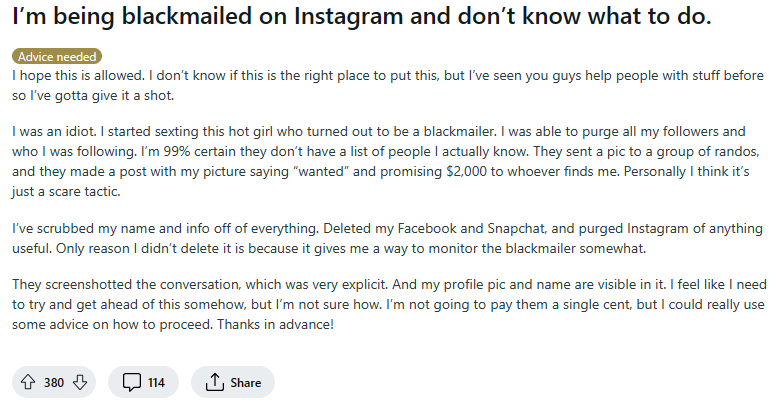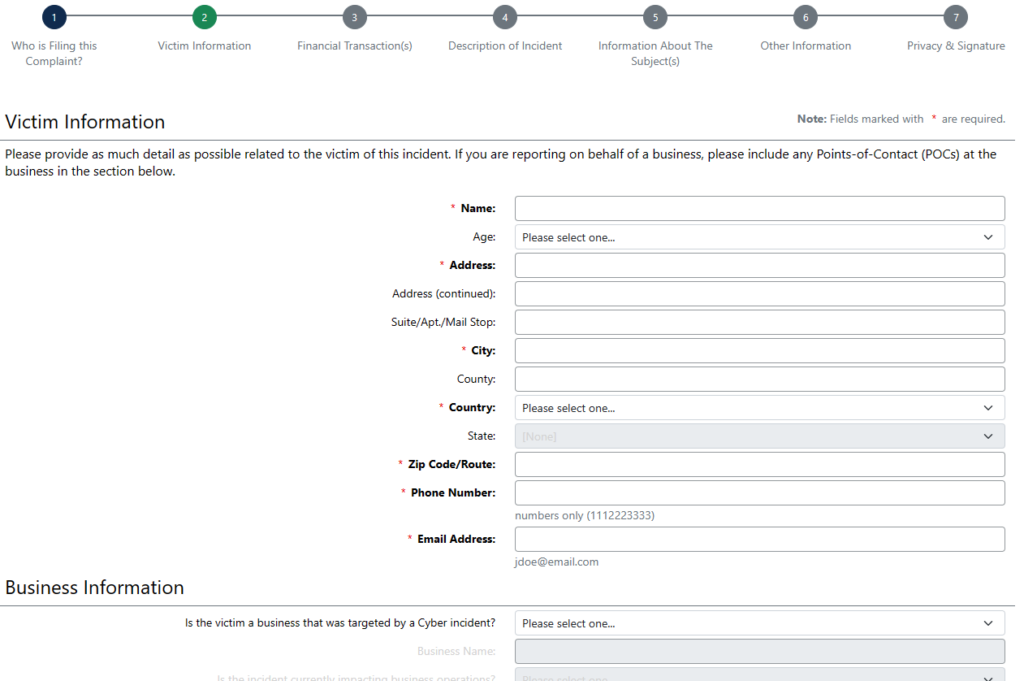Table of Contents
Keep on reading to learn how to deal with social media blackmail.
There’s perhaps nothing scarier than someone threatening to expose sensitive information (for example, explicit content like intimate images) about you online unless you comply with their demands.
This is known as online blackmail, and it can cause an incredible amount of hurt, embarrassment, and stress in both your professional and personal life.
In this guide, we’ll discuss what online blackmail is and how to deal with it on social media.
What Is Online Blackmail?
Online blackmail (often referred to as online extortion) is threatening to reveal damaging private information (including nudes) about a person online in exchange for payment or some other benefit.
Blackmail is a crime in every state. In many states, including California, blackmail falls under the extortion statute.
Common forms of cyber blackmail include cyberbullying and “sextortion,” or threatening individuals with public exposure of damaging information like nude photos in exchange for something (often sexual favors).
What Is Social Media Blackmail?
Social media blackmail is online blackmail that happens on social media sites like Facebook, TikTok, and Snapchat.
Unfortunately, as can be seen from the below Reddit post, social media blackmail happens all the time:

What to Do If Someone Is Blackmailing You Online
Being a target of online extortion on social media can be a terrifying experience, but luckily, there are actions you can take if you find yourself a victim.
1. Do not engage the blackmailer
First and foremost, cease communication with the blackmailer immediately. Responding might invoke more aggressive threats because you might appear an easy target.
The best thing to do is not engage at all. Avoid negotiation and never give in to demands.
If possible, change your privacy settings from public to private on all social media accounts, including those they haven’t contacted you on.
2. Report the blackmailer to the social media site
Pretty much all social media platforms let you report abusive behaviors.
Here’s how you can report blackmail/sextortion on popular social media sites:
3. Tell a family member or someone else you trust
Experiencing a blackmail attempt can be very distressing and overwhelming. Telling a loved one what is happening can help you feel less alone.
4. Save all communications as evidence
If you’re being blackmailed on social media, you must collect as much evidence as possible regarding that blackmail.
Capture screenshots of every correspondence and record any potential personal information about the blackmailer, such as usernames, emails, or phone numbers.
Record all communications from the blackmailer, including blackmail threats that extend beyond social media (for example, text messages).
5. Report online blackmail to the FBI
Once you have gathered as much evidence as possible, you should report blackmail to the authorities.
You can file a complaint with the FBI’s Internet Crime Complaint Center (IC3). The IC3 investigates cybercrime cases.
To file the complaint, fill out the IC3 online form. Agree to the terms and conditions, fill out your personal information, describe the incident, provide the evidence you gathered, and, finally, sign and submit the complaint.

Complaints filed with IC3 are processed and then possibly referred to local, state, federal, or international regulatory or law enforcement agencies for further investigation.
6. Report online blackmail to the local police
After filing an IC3 report with the FBI, you should also report the crime to the local police.
Unlike filling the IC3, it’s more appropriate to appear in person at a headquarters near you when dealing with local law enforcement.
After filing a police report with the local police, you’ll likely receive information about your rights and recommendations on how to proceed.
How to Protect Yourself Against Online Blackmail
The reality is that the more personal information you have online, the more likely you are to be a target of online blackmail.
Below are some steps you can take to reduce your chances of being blackmailed on social media and elsewhere online.
Ultimately, the best way to protect yourself is to remove as much information about you online as possible.
Use strong passwords
Sextortion incidents often result from compromised online security, so strengthening your passwords should be the first line of defense to protect any sensitive information, including personal accounts or social media profiles.
Strong and unique passwords (12 characters long and a mix of numbers, letters, and symbols) for every online account is the key to keeping your personal information safe.
If keeping track of numerous passwords proves difficult, you can use a password manager to keep your passwords securely in one place.
Be mindful on social media
Blackmailers will likely try to use public information from your social media accounts against you, so share as little information as possible.
Set your profiles to private to stop potential blackmailers from accessing your list of friends.
Also, consider ceasing contact with any online connections you don’t know personally. Never add a friend you only know online, particularly if you’ve encountered them recently.
If the blackmail happens on a specific social media platform, report the incident immediately to the respective platform to prevent the blackmailer from targeting others.
Be aware of common scams
In many blackmail incidents, the blackmailers are often bluffing, targeting hundreds of victims with the same blackmail scam, hoping someone will take the bait.
By learning about common scams, you can call their bluff immediately.
One common extortion attempt involves a blackmailer posing as an agent of the FBI, IRS, or other federal authority and claiming the target has committed a crime or owes money. The blackmailer typically demands payment to “call off an arrest” or “reduce charges.”
Another bluff is when a blackmailer claims malware has been planted on a target’s computer, and they’ve subsequently gained access to a webcam and/or browsing history. The blackmailer will often claim the target has “visited adult websites” and has been “recorded on camera.”
Opt out of data-broker sites
The less potential blackmailers can learn about you, the safer you are. Therefore, it is highly recommended that you remove your information from data brokers to protect your privacy.
Data brokers are companies that gather vast amounts of personal information about you and sell it onward for profit, often to the highest bidder. The profile they compile on you from this information could include everything from your phone number to your marital status.
Data brokers are one reason you get junk mail, robocalls, and spam texts. They also make you a target for phishing scams and identity theft. In worst-case scenarios, they can open you up to online blackmail or extortion.
To prevent your information from ending up in the wrong hands, you need to delete your profile from each data broker site. You can do this manually using our free DIY opt-out guides.
You can also sign up for our data broker removal service. Our privacy experts will remove you from any data broker sites you appear in, and they’ll do so continuously. This is important as data brokers are known to relist people (even after they opt out) when they find more data about them.
DeleteMe is our premium privacy service that removes you from more than 30 data brokers like Whitepages, Spokeo, BeenVerified, plus many more.
Save 10% on DeleteMe when you use the code BLOG10.
Our privacy advisors:
- Continuously find and remove your sensitive data online
- Stop companies from selling your data – all year long
- Have removed 35M+ records of personal data from the web
Save 10% on any individual and family privacy plan with code: BLOG10












